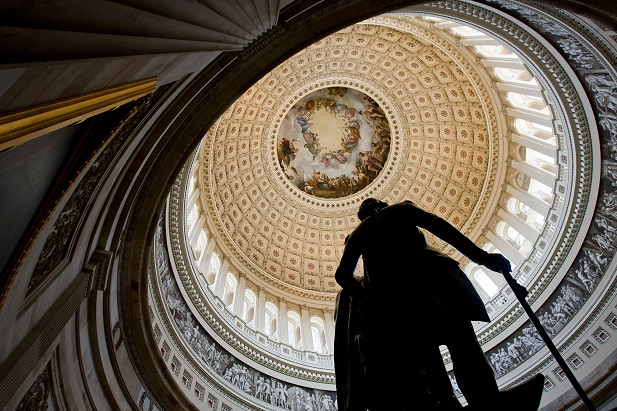 U.S. Capitol Rotunda, (Photo: Diego M. Radzinschi/ALM)
U.S. Capitol Rotunda, (Photo: Diego M. Radzinschi/ALM)
The full House passed, by a 297-120 vote on Tuesday, the year-end spending bill, which includes the Setting Every Community Up for Retirement Enhancement (SECURE) Act. The SECURE Act, H.R. 1994, is being billed as the most comprehensive retirement security legislation in more than a decade. The Senate is expected to vote on the spending bill today or Thursday, as the continuing resolution currently funding the government expires on Friday.
The American Retirement Association (ARA) expects the bill to reach President Donald Trump's desk for his signature by the end of the week.
"The elements of this critical legislation have enjoyed bipartisan support in both houses of Congress, and for good reason," said Brian Graff, ARA's CEO. "American workers are concerned about retirement, and this legislation will help expand access to these critical programs."
Retirement-industry lobbyists cheered the passage of the bill, which would smooth the way for more annuities in retirement plans and make it easier for small employers to band together in shared pension plans.
The ARA noted that the SECURE Act, which mirrors the version passed in the House earlier this year, would:
- simplify the 401(k) safe harbor rules;
- expand portability of lifetime income options;
- allow long-term part-time workers to participate in 401(k) plans;
- allow plans adopting by the filing due date to be treated as in effect as of close of year;
- provide a fiduciary safe harbor for selection of a lifetime income provider;
- modify the treatment of custodial accounts on termination of 403(b) plans;
- extend the current required minimum distribution requirements to age 72;
- require disclosures regarding lifetime income; and
- modify the nondiscrimination rules to protect longer-service participants.
The ARA also says the SECURE Act addresses "the real challenges that small-business owners face—including costs, administrative burdens, and increased liability for mistakes—when they consider providing retirement benefits for their workers."
To that end, the SECURE Act "allows for unrelated employers to join a pooled employer plan, significantly increases the small-employer pension plan startup tax credit, up to $5,000, and gives business owners more flexibility to help guide their decision-making."
See also:
- 5 Ways the Secure Act Would Affect Retirement, 529 Plans
- The Mega Backdoor Roth IRA and Other Ways to Maximize a 401(k)
TIAA applauded the bill on Tuesday for also requiring "an annual statement that illustrates retirement-account balances as a monthly income stream to show participants what they may expect to see as their 'paycheck' meant to last throughout retirement, a critical piece of a sound retirement plan."
With life expectancy growing, the SECURE Act "will also allow Americans to put more money into their retirement accounts by raising the age of required minimum distributions," said Roger Ferguson, TIAA's president and CEO. "Together, all of these provisions will significantly help Americans build their financial futures."
Ken Bentsen, president and CEO of the Securities Industry and Financial Markets Association (SIFMA), said in a Tuesday statement that House passage of the bipartisan SECURE Act "will enable even more Americans to participate in our retirement system and better prepare for a secure retirement. This legislation takes important steps toward enhancing the private retirement system, including common-sense provisions that would encourage small businesses to offer retirement savings plans and encourage individuals to utilize the options that are available to enjoy retirement security."
From: ThinkAdvisor
© Touchpoint Markets, All Rights Reserved. Request academic re-use from www.copyright.com. All other uses, submit a request to [email protected]. For more inforrmation visit Asset & Logo Licensing.



